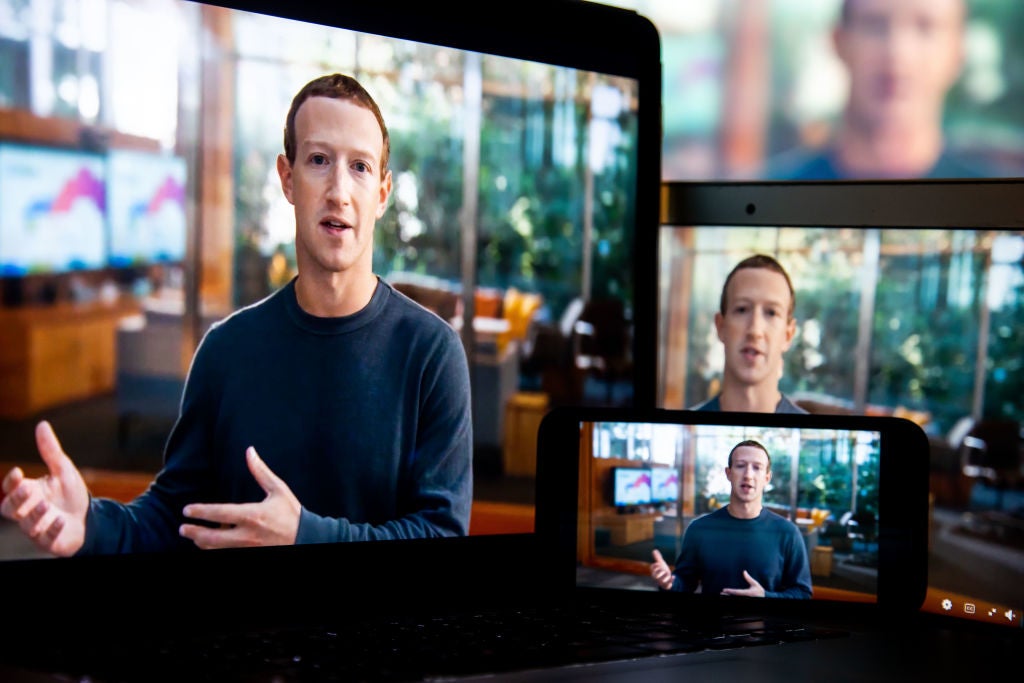
Mark Zuckerberg’s grand vision of a metaverse is “validated” by the current generative artificial intelligence (AI) race brought on by the popularity of OpenAI’s ChatGPT, an expert has claimed.
It comes as metaverse-mad Zuck announced that Meta will be testing AI-powered tools for its products, most notably on WhatsApp and Messenger.

Access deeper industry intelligence
Experience unmatched clarity with a single platform that combines unique data, AI, and human expertise.
“The generative AI race perhaps validates Zuckerberg’s Metaverse vision,” Colin Hayhurst, CEO of search engine Mojeek, told Verdict.
“Virtual worlds are built from digital assets and thrive on engagement, so as the digital engagement champion of the 2010s, it may play to Meta’s strengths.”
However, Meta has spent most of the time since its name change two years ago pushing for a metaverse – something Zuckerberg is betting on being “the future of computing.”
Some experts have seen Meta’s launch into the AI race as nothing more than just keeping up appearances.

US Tariffs are shifting - will you react or anticipate?
Don’t let policy changes catch you off guard. Stay proactive with real-time data and expert analysis.
By GlobalData“Meta’s announcement that it’s working on AI personas is not surprising, the amount of media interest AI has recently gained through ChatGPT means that large tech companies are being compelled to announce their research and development plans,” Natalie Cramp, CEO of data consultancy Profusion, told Verdict.
Text-based AI tools are being tested right now in Messenger and WhatsApp, likely taking the form of conversation bots similar to that of ChatGPT.
According to a spokesperson, the company eventually wants to make “AI personas that can help people in a variety of ways.”
Meta is also reportedly experimenting with AI-aided filters and ad formats on Instagram – using new AI tools to potentially boost revenue streams.
Zuckerberg wants the metaverse, but he wants money too
New streams of revenue are top of mind for Zuckerberg, who hasn’t quite seen a return to his metaverse dreams yet.
“Meta desperately needs new sources of revenue as its metaverse project won’t provide any immediate returns,” Laura Petrone, analyst at GlobalData, told Verdict.
“It’s becoming clear now that when Zuckerberg mentioned that this was the year of efficiency for Meta, what he meant was shifting the focus away from the metaverse to more tangible revenue opportunities.”
This makes sense when noting the recent announcement of the Meta Verified subscription program. A service extremely similar to Elon Musk’s revamped Twitter Blue.
“Meta launching a paid subscription service to verify Facebook and Instagram users might help boost profits in the short-term, but in the long-term risks turning off new users with less privacy and digital experience,” Scott Ewings, Chief Experience Officer at digital transformation company TPXimpact, previously told Verdict.
The news comes after Meta announced it was releasing its own large language model – the system that powers other applications like ChatGPT, Google’s Bard and Microsoft’s Bing AI.
Meta claimed the model is able to outperform ChatGPT, despite its smaller size. It has also been made publicly available to researchers, which Meta says will offer insights into how to mitigate issues such as bias and misinformation.
“Meta’s focus on tackling AI bias and toxicity is commendable, as these are important issues and significant barriers to AI progress,” Sarah Coop, analyst at research firm GlobalData, told Verdict.
“However, the devaluing of ChatGPT suggests this is also just another commercial venture in the AI arms race.”
AI is nothing new, but it’s booming
Of course, AI tools have been around for years but never has the race to be the best in generative AI been so prominent.
The mainstream popularity of OpenAI’s ChatGPT bot has pushed companies to rush to get ahead of the game.
It’s been a mixed bag so far. Microsoft has seemingly injected some AI sauce into its Bing search and Edge browser without too much trouble.
Google, however, had a very public mishap when its ChatGPT copycat, Bard, answered a query wrong during a demonstration. The slip-up led to shares in parent company Alphabet falling more than 7%, knocking a whopping $100bn off its market value, the BBC reported.
GlobalData is the parent company of Verdict and its sister publications.







